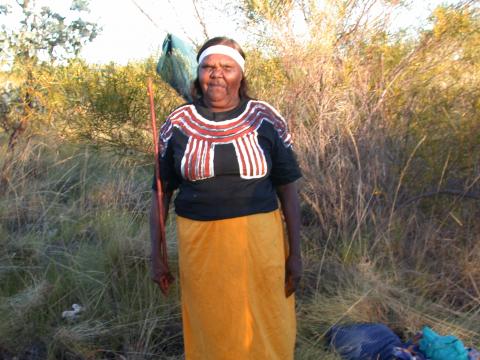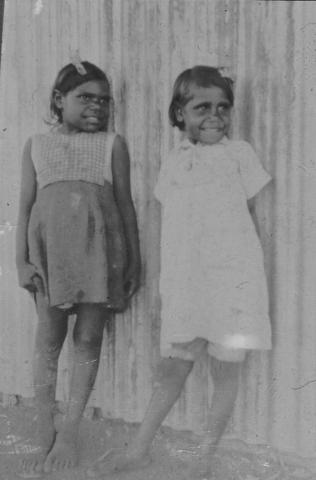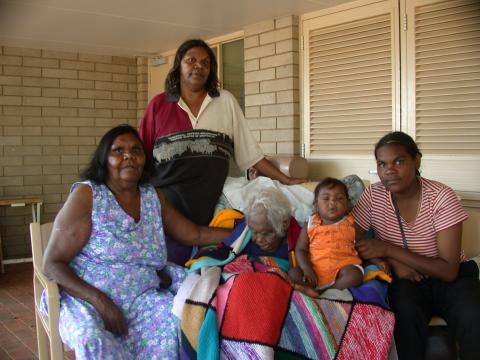Edith Graham Nakkamarra
I Keep Going: Life story of E. Nakkamarra Graham
Told by: E. Nakkamarra Graham, R. Namikili Graham and L. Namikili Graham
Early Life
I reckon I was born here at Wakiriji, back behind the hill where the main camp was. My Mum was here and Dad was here, whole mob of Wumpurrani people. People been living here all this way. From here when them miners came people moved to Six mile, missionaries came. Them policemen came to the road. That old man, uncle, he told us the policemen said the miners coming. The old lady she heard that noise from the mine. It freighted her.
Mr. Long and Mr. David them two missionaries came and took everyone to Six Mile. That big mob went to Six Mile then, with everything, swags, nanny goats, all piled up. Some went in the wagon. Dad worked in town at the police station. He traveled south and west, everywhere.
Warumungu people were living here in Tennant Creek before any others. My Dad used to tell us about the old days. People came from the west got shot, a lot of people got shot out at the Pebbles all the way up to Attack Creek. Papulanji would chase them with horses. Dad helped them, those poor buggars, Warlpiri mob. He hid them in a cave so the rangers couldn’t track them.
Mission Days
It was bad when they took the kids from their mothers. They took all the half-caste kids. A lot of those kids never got to see their mothers, they died there in Darwin. Joyce and her cousin (living here in Tennant Creek) were two of the kids taken away to Darwin. Topsy’s sister went to Darwin too. The parents couldn't see them at all. Many of the parents died because they were thinking and worrying too much. Joyce still hasn't gotten any money from the government. They took half-caste kids from Booroloola, Brunette Downs, Alroy, everywhere. Mr. Sweeny he was a bad man. He was the big boss in Darwin for the kids. At Brunette Downs the old people would hide the kids in the caves so they wouldn't be taken away and in the holes in the floors, they put rugs over them so the welfare people couldn't find them. The welfare was killing the little ones, saying that there were to many half-caste kids. They took little kids and big kids from here too. Some parents tried to run away to the bush with the kids but they would go after them and hunt them down. They took half-caste kids all around even down to Alice Springs.
They had a water hole near the mission where they would swim in the water early in the morning before breakfast. They all ate together then they would go to school. In the school the boys and girls weren't separated. But at play times they were separated as well. They were only together at meals and in school. In church the boys sat in the front then the girls then the old people. At the mission they made the kids clothes out of flour and sugar bags they would die them blue and green so all the kids wore the same thing. Even though they had clothes brought in from town, they had to wear these uniforms. May and Mrs. Nixon they were there too. They didn't have shoes, even on a hot day they had to go without. They would use the prickly leaves to walk on and they would use it as a comb. The kids weren't given any combs.
The boss's name was Tom. The missionary there, he done the wrong thing to us mob. They took him away and locked him up. Then the kids were taken to other places. They closed Phillip Creek. They had the same teachers, but not that missionary.
One year around Christmas I got sick. I was at the mission school, dizzy and shaking and I couldn't eat Christmas dinner. They took me to the little hospital at the mission. I blacked out, nearly died. A truck come and took me to the Tennant Creek hospital for one month. I lost a lot of weight, got real skinny. The doctor said they couldn't fix me up. They put me back on the truck to Phillip Creek. I was really skinny and couldn't talk. I couldn’t see people when they visited. I must have been at the Phillip Creek hospital for six months. The missionaries would come and pray and sit. They tried to get me up and out of bed to walk around, but I just fell. The older kids would come and talk to me. I just lay there. The old people, my Mum and the old ladies, had corroborees for me, they danced all night. The old blind lady had a dream and told me I shouldn’t worry, I would get better. Then I started to see people and know them. But I still couldn’t get up. It was a long time, must have been months, the old ladies would feed me with a spoon. I would shake, I was weak. But everyday the old lady would come and help me up out of bed and walk me around. Everybody came to the hospital to see me. Then one day I went back to school. Slowly I was better. The old lady said it was those Mungamunga who came to me.
Town and Station Life
Tennant Creek was small then, just the Post Office and one pub. The movie house was just starting. They would bring kids in from Phillip Creek on Wednesday and Saturday to see the movies. In one truck, we all would hang off the sides. We saw movies with John Wayne. We had lollies. We didn't know about the movies, we thought they were ghosts. The old people didn't like watching the movies, there was too much shooting. Some kids weren’t allowed to go. We would tell them when we got back. After the movies we couldn’t stay in town, just to get a lollie at the shop, then we would all go back in the truck to the mission.
I started working at Brunchilly station when I was 16. Other Warumungu people were there, ladies. She got up early in the morning to cook for the station manager and they worked all day. Not for money just for tucker when she first started, then after a while they received money, clothes and a ration. She did cooking, washing, ironing and gardening all day. Some of the ladies milked the cows and goats and they made there own butter. I had three kids at the station. The kids were born and two weeks later I was back to work. The old ladies would look after the kids. We worked only for rations and blankets first, then money.
Then we went to Banka Banka Station. Mark was born there. I worked with the old ladies, we washed them school kids clothes all day. They took them off and we cleaned them up for the next day. We took the toilet water out too, in big bucket, hanging. Some ladies cut wood, true. It was good too; we got money, not just rations. Banka Banka was a good place, Old Mrs. Ward she was a good old lady. Mrs. Ward got houses in town for Aboriginal people.
We moved to town then and I worked for the Homemakers. First we lived at the Village, big mob of people there. We all worked, all the ladies and the kids went to school. I worked for Homemakers for nine years, washing and sewing making clothes for kids. Mrs. Maloney and Mrs. Finney were the bosses at the Homemakers. It was good. We worked and got money. But it was a lot of work, ironing all day.
Later we moved to Crescent Street and then Staunton Street. That old lady lived with us for a while. Then she went to the home. Linda used to take care of her. I was working then. Then I started working at Papulu Apparrkari. We went to the high school and the primary school and the CLC mob took us to meetings.
Now I’m too old. I need to sit at home with the grandkids.


